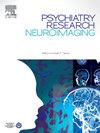A coordinate-based meta-analysis of grey matter volume differences between adults with obsessive-compulsive disorder (OCD) and healthy controls
IF 2.1
4区 医学
Q3 CLINICAL NEUROLOGY
引用次数: 0
Abstract
According to the cortico-striato-thalamo-cortical (CSTC) model of obsessive-compulsive disorder (OCD), the striatum plays a primary role in its neuropathophysiology. Hypothesising that volumetric alterations are more pronounced in subcortical areas of patients within the CSTC circuit compared to healthy controls (HCs), we conducted a coordinate-based meta-analysis of magnetic resonance imaging (MRI) studies. We included 26 whole-brain MRI studies, comprising 3,010 subjects: 1,508 patients (788 men, 720 women; mean age: 30.26 years, SD = 8.16) and 1,502 HCs (801 men, 701 women; mean age: 29.47 years, SD = 7.88). This meta-analysis demonstrated significant grey matter volume increases in the bilateral putamen, lateral globus pallidus, left parietal cortex, right pulvinar, and left cerebellum in adults with OCD, alongside decreases in the right hippocampus/caudate, bilateral medial frontal gyri, and other cortical regions. Volume increases were predominantly observed in subcortical areas, with the exception of the left parietal cortex and cerebellar dentate, while volume decreases were primarily cortical, aside from the right hippocampus/caudate. Further exploration of these neuropathophysiological correlates could inform specific prevention and treatment strategies, advancing precision mental health in clinical applications.
基于坐标的荟萃分析:强迫症(OCD)成人患者与健康对照组之间的灰质体积差异
根据强迫症(OCD)的皮质-纹状体-眼球-皮质(CSTC)模型,纹状体在其神经病理生理学中扮演着主要角色。我们推测,与健康对照组(HCs)相比,CSTC 回路内患者皮层下区域的体积变化更为明显,因此我们对磁共振成像(MRI)研究进行了基于坐标的荟萃分析。我们纳入了 26 项全脑磁共振成像研究,包括 3010 名受试者:1,508 名患者(788 名男性,720 名女性;平均年龄:30.26 岁,SD = 8.16)和 1,502 名正常人(801 名男性,701 名女性;平均年龄:29.47 岁,SD = 7.88)。这项荟萃分析表明,成人强迫症患者的双侧丘脑、外侧苍白球、左顶叶皮层、右侧脉络膜和左侧小脑的灰质体积显著增加,而右侧海马/尾状核、双侧内侧额叶和其他皮层区域的灰质体积则有所减少。除了左侧顶叶皮层和小脑齿状突起外,皮层下区域的体积主要增加,而除了右侧海马/尾状核外,体积减少的主要是皮层。对这些神经病理生理学相关因素的进一步探索可为具体的预防和治疗策略提供依据,从而推动精准心理健康在临床应用中的发展。
本文章由计算机程序翻译,如有差异,请以英文原文为准。
求助全文
约1分钟内获得全文
求助全文
来源期刊
CiteScore
3.80
自引率
0.00%
发文量
86
审稿时长
22.5 weeks
期刊介绍:
The Neuroimaging section of Psychiatry Research publishes manuscripts on positron emission tomography, magnetic resonance imaging, computerized electroencephalographic topography, regional cerebral blood flow, computed tomography, magnetoencephalography, autoradiography, post-mortem regional analyses, and other imaging techniques. Reports concerning results in psychiatric disorders, dementias, and the effects of behaviorial tasks and pharmacological treatments are featured. We also invite manuscripts on the methods of obtaining images and computer processing of the images themselves. Selected case reports are also published.

 求助内容:
求助内容: 应助结果提醒方式:
应助结果提醒方式:


